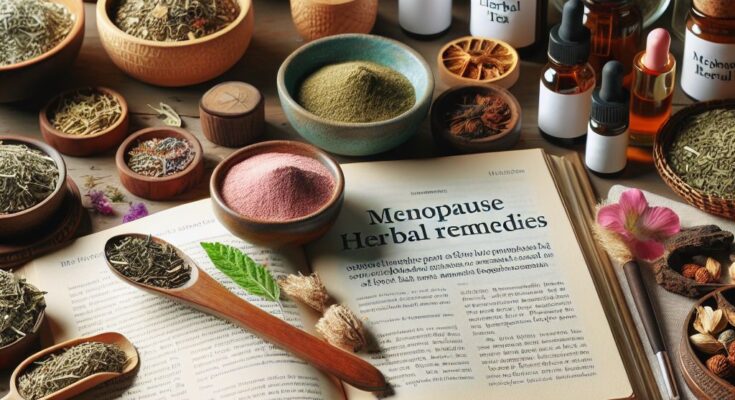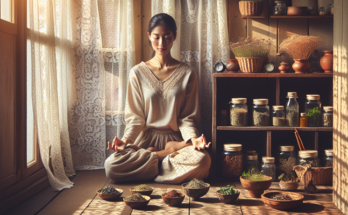Discover the power of herbal remedies for menopause relief. In this guide, we explore plant-based medicine’s holistic approach to alleviating menopausal symptoms. From hot flashes to mood swings, uncover natural solutions tailored for women. Dive in for insights on harnessing the healing properties of herbs to navigate menopause with ease and vitality.
Key Takeaways
- Menopause symptoms can be managed using natural herbal remedies.
- Black Cohosh and Red Clover are among the top herbs for reducing hot flashes and hormonal imbalance.
- Ginseng may improve energy and cognitive function during menopause.
- St. John’s Wort and Valerian Root can help alleviate mood swings and promote better sleep.
- Always consult with a healthcare provider before starting any herbal treatment to avoid potential interactions.
Herbal Allies: Meeting Menopause with Nature’s Help
When you’re navigating through the waves of menopause, it’s like steering a ship through uncharted waters. But you’re not alone, and nature provides a compass in the form of herbal remedies. These plant-based allies have been used for centuries to bring relief and balance to women’s lives, and they’re just as relevant today.
Identifying Your Menopause Symptoms
Before diving into the herbal treasure trove, it’s crucial to pinpoint what you’re dealing with. Menopause can come with a variety of symptoms, such as hot flashes, night sweats, mood swings, and sleep disturbances. Recognizing your symptoms is the first step towards finding the right herbal remedies to bring you relief.
Why Choose Herbal Remedies?
Herbal remedies offer a natural and holistic approach to managing menopause symptoms. They work in harmony with your body, supporting its natural processes instead of overriding them. Besides that, they often come with fewer side effects compared to conventional hormone replacement therapy (HRT).
The Top Herbal Remedies for Menopause
Now, let’s talk about the most effective herbs that could be your allies during this transition. These are not just any plants; they’ve been backed by both tradition and science, offering a comforting blend of wisdom and evidence.
- Black Cohosh: Known for reducing hot flashes and night sweats.
- Ginseng: May improve energy and cognitive function.
- Red Clover: Contains phytoestrogens that may help balance hormones.
- St. John’s Wort: Often used to lift mood and reduce anxiety.
- Valerian Root: Aids in achieving restful sleep.
Remember, each woman’s experience with menopause is unique, and what works for one may not work for another. It’s all about finding the right fit for your body and your symptoms.
Black Cohosh: Easing Hot Flashes and Night Sweats
Black Cohosh is like a cool breeze on a sweltering day for many women. It’s been studied extensively and is commonly used for its potential to lessen the intensity and frequency of hot flashes and night sweats. Most importantly, it’s about giving you back the comfort you deserve.
Ginseng: Boosting Energy and Mental Clarity
Feeling like you’re in a fog? Ginseng might be the beacon of light you need. This ancient root is revered for its ability to boost energy and sharpen your mind. It’s not just about getting through the day; it’s about enjoying it with vitality and clear-headedness.
Stay tuned for more insights on herbal remedies for menopause, including detailed information on Red Clover, St. John’s Wort, and Valerian Root, as well as practical tips on integrating these herbs into your daily routine.
Red Clover: Balancing Hormones Naturally
Imagine a field of red clover under the warm sun—this pretty plant is more than just a sight to behold. It’s rich in isoflavones, a type of phytoestrogen, which are plant-based compounds that mimic estrogen in the body. This can be particularly helpful when your own estrogen levels are taking a rollercoaster ride. Red Clover has been linked to easing symptoms like hot flashes and improving bone health. Just picture it: a natural remedy that not only cools you down but also keeps you strong.
St. John’s Wort: Lifting Mood and Reducing Anxiety
St. John’s Wort is like a ray of sunshine on a cloudy day for your mood. It’s been used for centuries to battle the blues, and during menopause, it might just be the friend you need. This herb is particularly known for its potential to improve mood and reduce anxiety, which can be a godsend when menopause has you feeling a little more ‘meh’ than usual.
Valerian Root: Promoting Restful Sleep
When counting sheep just doesn’t cut it, Valerian Root could be your ticket to dreamland. This herb has been traditionally used to promote sleep and reduce the time it takes to fall asleep. Menopause can often bring about sleep disturbances, and a good night’s rest is crucial. With Valerian Root, you’re not just aiming for more sleep; you’re aiming for better sleep.
Creating Your Herbal Menopause Toolkit
Now that we’ve explored some of the top herbal remedies for menopause, let’s talk about putting together your personal toolkit. This isn’t about randomly picking herbs off the shelf. It’s about choosing wisely and knowing how to use them effectively.
Selecting Quality Herbs
The first step is to ensure you’re getting high-quality herbs. Look for reputable suppliers who offer organic, non-GMO herbs. You want the pure stuff, without any unnecessary additives or pesticides. Quality matters because you’re trusting these herbs to support your health.
Herbal Formulations and Dosages
Formulations and dosages are where things get personal. You might find that a combination of herbs in a specific formulation works best for you, or maybe a single herb hits the spot. It’s all about listening to your body and observing how it responds.
For instance, you might start with a standard dose of Black Cohosh extract, commonly suggested at around 20 to 40 milligrams twice daily. But remember, this is just a starting point. You may need to adjust based on how your body reacts.
And here’s a tip: keep a symptom diary. It can be incredibly helpful to track your symptoms and how they correlate with the herbal remedies you’re trying. This way, you can fine-tune your approach for the best results.
- Start with recommended dosages on product labels or as advised by a healthcare provider.
- Adjust dosages based on your body’s response and symptom relief.
- Consider combination formulas for a synergistic effect or single herbs for targeted relief.
- Track your symptoms and response to different herbs in a diary.
Keep in mind that herbs can take time to show their full effect. Patience is key. You might need to stick with a regimen for a few weeks before deciding if it’s working for you.
Integrating Herbal Remedies into Your Daily Routine
So, you’ve got your toolkit ready. Now, how do you make these herbal remedies a part of your daily life? It’s simpler than you might think, and it’s all about finding what fits seamlessly into your routine.
Teas, Tinctures, and Capsules: Modes of Taking Herbs
Herbs come in many forms, and each has its own advantages. Tea can be a soothing way to end the day, while tinctures are potent and fast-acting. Capsules are convenient and provide a precise dosage. Here’s how you can incorporate each into your day:
Teas: Brew a cup of herbal tea, like Red Clover or Valerian, in the evening to unwind.
Tinctures: Use a dropper to add a tincture, such as Black Cohosh, to water or juice.
Capsules: Take a capsule, like St. John’s Wort, with your morning or evening meal.
Lifestyle Changes to Enhance Herbal Benefits
Herbs are powerful, but they work best when paired with a healthy lifestyle. Regular exercise, a balanced diet, and stress-reducing activities like meditation can all amplify the benefits of your herbal regimen.
Understanding the Science: Research on Menopause Herbal Remedies
Let’s peel back the curtain and look at the science behind these herbal remedies. While anecdotal evidence abounds, it’s the clinical research that can give us confidence in their efficacy.
Evidence Supporting the Use of Herbal Treatments
Studies have shown that Black Cohosh can significantly reduce menopause symptoms like hot flashes. Red Clover’s isoflavones have been linked to a decrease in the severity and frequency of hot flashes, while Ginseng has shown potential in enhancing mental performance and well-being.
As for St. John’s Wort, research suggests it may be as effective as antidepressants for mild to moderate depression, without some of the side effects. Valerian Root’s ability to improve sleep quality has also been supported by various studies.
Addressing Safety Concerns and Potential Interactions
While herbal remedies are natural, they’re not without their risks. It’s essential to be aware of potential side effects and interactions, especially if you’re taking other medications. For example, St. John’s Wort can interact with a wide range of pharmaceuticals, potentially diminishing their effectiveness.
Always consult with a healthcare provider before starting any new herbal treatment, especially if you have existing health conditions or are on medication.
When to Seek Professional Guidance
Embarking on an herbal journey can be exciting, but it’s important to do it safely. That’s where professional guidance comes in.
Consulting with a Herbalist or Healthcare Provider
- Seek a consultation before starting any herbal regimen, particularly if you’re on medication or have health concerns.
- A healthcare provider can advise on safe dosages and possible interactions.
- An experienced herbalist can offer personalized herbal blends tailored to your symptoms.
They can provide the map to navigate the waters of menopause with the help of herbal remedies. They’ll help you understand which herbs might work best for you and how to use them safely.
Monitoring Your Progress and Adjusting Regimens
Once you start your herbal regimen, keep a close eye on how you feel. If something isn’t working, don’t hesitate to reach out to your healthcare provider or herbalist. They can help you adjust dosages or switch herbs as needed.
Remember, the goal is to find relief and balance during menopause. With the right herbs, a supportive lifestyle, and professional guidance, you can navigate this natural transition with grace and wellbeing.
FAQs
As we wrap up our discussion on herbal remedies for menopause, let’s address some common questions you might have. These FAQs will help you make informed decisions about incorporating plant-based medicine into your life.
Can herbal remedies replace hormone replacement therapy?
Herbal remedies offer a natural alternative to hormone replacement therapy (HRT), but they may not be a complete replacement, especially for severe symptoms. They can be part of a holistic approach to managing menopause symptoms. It’s essential to discuss with your healthcare provider to determine the best course of action for your individual needs.
How long does it take for herbal remedies to alleviate menopause symptoms?
Patience is key when using herbal remedies. Some women may notice improvements within a few weeks, while for others, it might take a couple of months. Consistency and monitoring your symptoms are crucial to evaluate the effectiveness of the treatment.
Are there any side effects to using herbs for menopause?
While generally considered safe, herbal remedies can have side effects and interact with other medications. For example, Black Cohosh may cause gastrointestinal discomfort for some women. Always consult with your healthcare provider before starting any new herbal regimen.
Can I use these herbs if I’m taking other medications?
It’s crucial to consult with a healthcare provider before combining herbal remedies with other medications. Herbs like St. John’s Wort can interact with various drugs, potentially affecting their efficacy or causing adverse effects.
- Review all current medications with your healthcare provider.
- Discuss potential interactions with herbal remedies.
- Consider alternative herbs if there’s a risk of interaction.
What lifestyle changes should accompany herbal remedies for menopause?
Alongside herbal remedies, incorporating lifestyle changes can enhance your wellbeing during menopause. A balanced diet, regular exercise, and stress reduction techniques like yoga or meditation can support your overall health and complement the effects of herbs.
How do I choose the right herb for my menopause symptoms?
Selecting the right herb starts with understanding your symptoms. Research herbs that target your specific concerns, and consider consulting with an herbalist or healthcare provider for personalized advice. Quality is also important, so opt for reputable brands and organic products whenever possible.
Is it safe to buy menopause herbal remedies online?
Purchasing herbal remedies online can be safe, provided you choose reputable retailers and brands. Look for products with clear labeling, quality assurance, and customer reviews. Always verify the source and ensure they adhere to good manufacturing practices.
Many women seek natural remedies for menopause symptoms, such as hot flashes, mood swings, and sleep disturbances. Herbal treatments, which often involve the use of phytoestrogens, have been suggested to alleviate some of these symptoms. However, it is crucial to consult with a healthcare provider before starting any new treatment to ensure it is safe and appropriate for your individual health needs.



